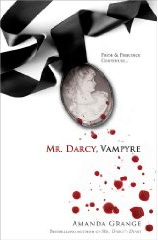Review: Mr. Darcy Vampyre by Amanda Grange
 Mr. Darcy, Vampyre starts on the morning of the wedding of Elizabeth and Jane to Darcy and Bingley. Austen always married her heroines off and ends with the wedding or the wedding on the horizon. I imagine that she wanted us all to dream of their happily ever afters. Austen had enough couples around her to know that not all matches ended in happiness — so she never went beyond the joyful anticipation of the wedding.
Mr. Darcy, Vampyre starts on the morning of the wedding of Elizabeth and Jane to Darcy and Bingley. Austen always married her heroines off and ends with the wedding or the wedding on the horizon. I imagine that she wanted us all to dream of their happily ever afters. Austen had enough couples around her to know that not all matches ended in happiness — so she never went beyond the joyful anticipation of the wedding.
Jane and Elizabeth are nervous and ecstatically happy to be marrying men they love — that these men are also rich adds to the joy of the day. Immediately after the service Darcy and Elizabeth are to tour the Lake District. But once in the carriage, Darcy reveals that he has changed their plans and they are going to Paris. Elizabeth is surprised but not against the plan. However, as the days pass, she become uneasy as Darcy seems to be struggling with some inner turmoil. Even more troubling to Elizabeth is that he hasn’t yet come to her room. She fears that he’s regretting the match.
It’s hard to discuss Mr. Darcy, Vampyre — or even read it — without being reminded of Bran Stoker’s Dracula; though the author said she was more influenced by Dr. Polidori’s The Vampyre. Jonathan Harker kept a journal. It was the pages of his journal that let the reader and his dear Mina vicariously experience the terror of his ordeal. These journal entries, as well as the more familiar narrative and newspaper reports, give Dracula an immediacy and a sense of reality to unrealistic events. In Mr. Darcy, Vampyre, Elizabeth writes letters to Jane trying in her own way to share her fears and misgivings about her marriage, Darcy’s withdrawn nature, and their erratic travels, and the people that they meet.
Darcy moves them from Paris to visit a relative he wants to consult with. They travel through the Alps and beyond where people greet the carriage by hastily crossing themselves. There’s more journeys to Venice and then Italy. Elizabeth is sure that something more is going on than what she sees or hears, but she’s unsure what it means or what to do. Phrases that don’t make sense. Lady Catherine showing up to fight with Darcy over his marriage. No matter how much she begs Darcy to talk to her he demurs and puts her off.
Elizabeth is such a strong character in Pride and Prejudice that her confusion and insecurity is cause for alarm in the reader. The parallels with Stoker’s Dracula echo throughout the narrative — subtle but enough to cue readers into what’s going on even if the title has been Mr. Darcy and his Bride. The book is dedicated to Catherine Morland of Northanger Abbey, but Elizabeth is no Catherine lost to her imagination and waiting to be rescued. Elizabeth’s “courage always rises with every attempt to intimidate” her. She stands up for herself making some difficult decisions. She doesn’t wait to be rescued she takes matters into her own hands.
Grange deviates significantly from the traditional tropes of vampire fiction. While the differences are significant there are other authors who have used some of these same deviations so a fan of vampire fiction would not scoff at the books –at least not until they read the ending. However, fans of Pride and Prejudice, with some exceptions, will be willing to forgive the deus ex machine ending simply because it allows of our favorite literary couples to continue their journey.
This is not a spoof of Gothic literature but a true melding of vampire fiction with a Pride and Prejudice follow on story. If you’re a Austen purists you probably won’t pick the book up anyway, but if you enjoy taking a chance on something a bit different, I think you’ll find the Darcy and Elizabeth of Pride and Prejudice working through some tough, and rather unexpected problems as they settle into their marriage.




